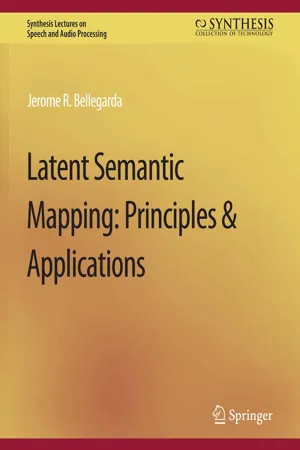
- English
- PDF
- Available on iOS & Android
eBook - PDF
About this book
Latent semantic mapping (LSM) is a generalization of latent semantic analysis (LSA), a paradigm originally developed to capture hidden word patterns in a text document corpus.
In information retrieval, LSA enables retrieval on the basis of conceptual content, instead of merely matching words between queries and documents. It operates under the assumption that there is some latent semantic structure in the data, which is partially obscured by the randomness of word choice with respect to retrieval. Algebraic and/or statistical techniques are brought to bear to estimate this structure and get rid of the obscuring ""noise."" This results in a parsimonious continuous parameter description of words and documents, which then replaces the original parameterization in indexing and retrieval.
This approach exhibits three main characteristics:
-Discrete entities (words and documents) are mapped onto a continuous vector space;
-This mapping is determined by global correlation patterns; and
-Dimensionality reduction is an integral part of the process.
Such fairly generic properties are advantageous in a variety of different contexts, which motivates a broader interpretation of the underlying paradigm. The outcome (LSM) is a data-driven framework for modeling meaningful global relationships implicit in large volumes of (not necessarily textual) data.
This monograph gives a general overview of the framework, and underscores the multifaceted benefits it can bring to a number of problems in natural language understanding and spoken language processing. It concludes with a discussion of the inherent tradeoffs associated with the approach, and some perspectives on its general applicability to data-driven information extraction.
Contents: I. Principles / Introduction / Latent Semantic Mapping / LSM Feature Space / Computational Effort / Probabilistic Extensions / II. Applications/ Junk E-mail Filtering / Semantic Classification / Language Modeling / Pronunciation Modeling / Speaker Verification / TTS Unit Selection / III. Perspectives / Discussion / Conclusion / Bibliography
Tools to learn more effectively

Saving Books

Keyword Search

Annotating Text

Listen to it instead
Information
Table of contents
- Cover
- Copyright Page
- Title Page
- Contents
- List of Figures
- List of Tables
- I Principles
- Part II Applications
- III Perspectives
- Bibliography
- Author Biography
Frequently asked questions
Yes, you can cancel anytime from the Subscription tab in your account settings on the Perlego website. Your subscription will stay active until the end of your current billing period. Learn how to cancel your subscription
No, books cannot be downloaded as external files, such as PDFs, for use outside of Perlego. However, you can download books within the Perlego app for offline reading on mobile or tablet. Learn how to download books offline
Perlego offers two plans: Essential and Complete
- Essential is ideal for learners and professionals who enjoy exploring a wide range of subjects. Access the Essential Library with 800,000+ trusted titles and best-sellers across business, personal growth, and the humanities. Includes unlimited reading time and Standard Read Aloud voice.
- Complete: Perfect for advanced learners and researchers needing full, unrestricted access. Unlock 1.4M+ books across hundreds of subjects, including academic and specialized titles. The Complete Plan also includes advanced features like Premium Read Aloud and Research Assistant.
We are an online textbook subscription service, where you can get access to an entire online library for less than the price of a single book per month. With over 1 million books across 990+ topics, we’ve got you covered! Learn about our mission
Look out for the read-aloud symbol on your next book to see if you can listen to it. The read-aloud tool reads text aloud for you, highlighting the text as it is being read. You can pause it, speed it up and slow it down. Learn more about Read Aloud
Yes! You can use the Perlego app on both iOS and Android devices to read anytime, anywhere — even offline. Perfect for commutes or when you’re on the go.
Please note we cannot support devices running on iOS 13 and Android 7 or earlier. Learn more about using the app
Please note we cannot support devices running on iOS 13 and Android 7 or earlier. Learn more about using the app
Yes, you can access Latent Semantic Mapping by Jerome R. Bellegarda in PDF and/or ePUB format, as well as other popular books in Technology & Engineering & Acoustical Engineering. We have over one million books available in our catalogue for you to explore.